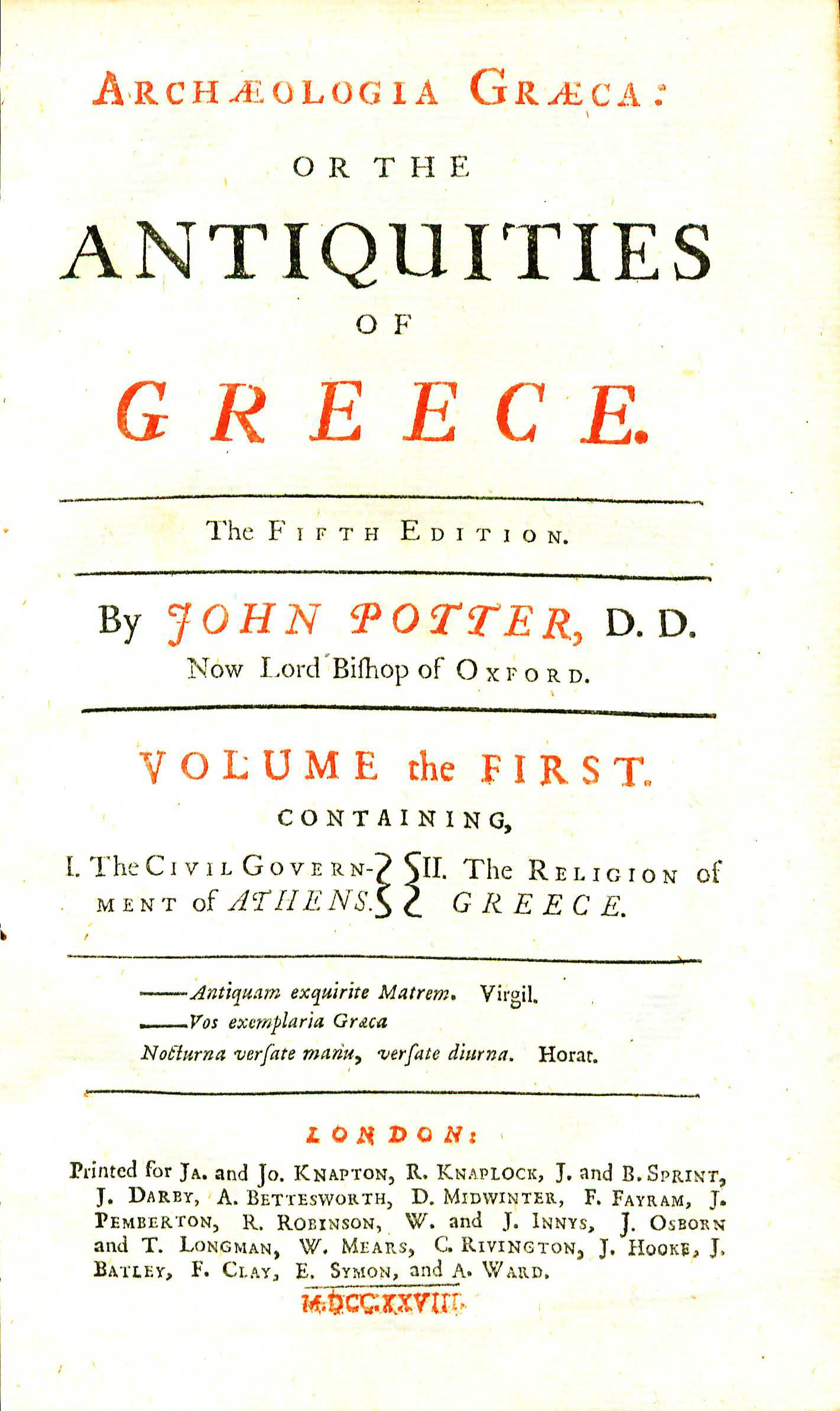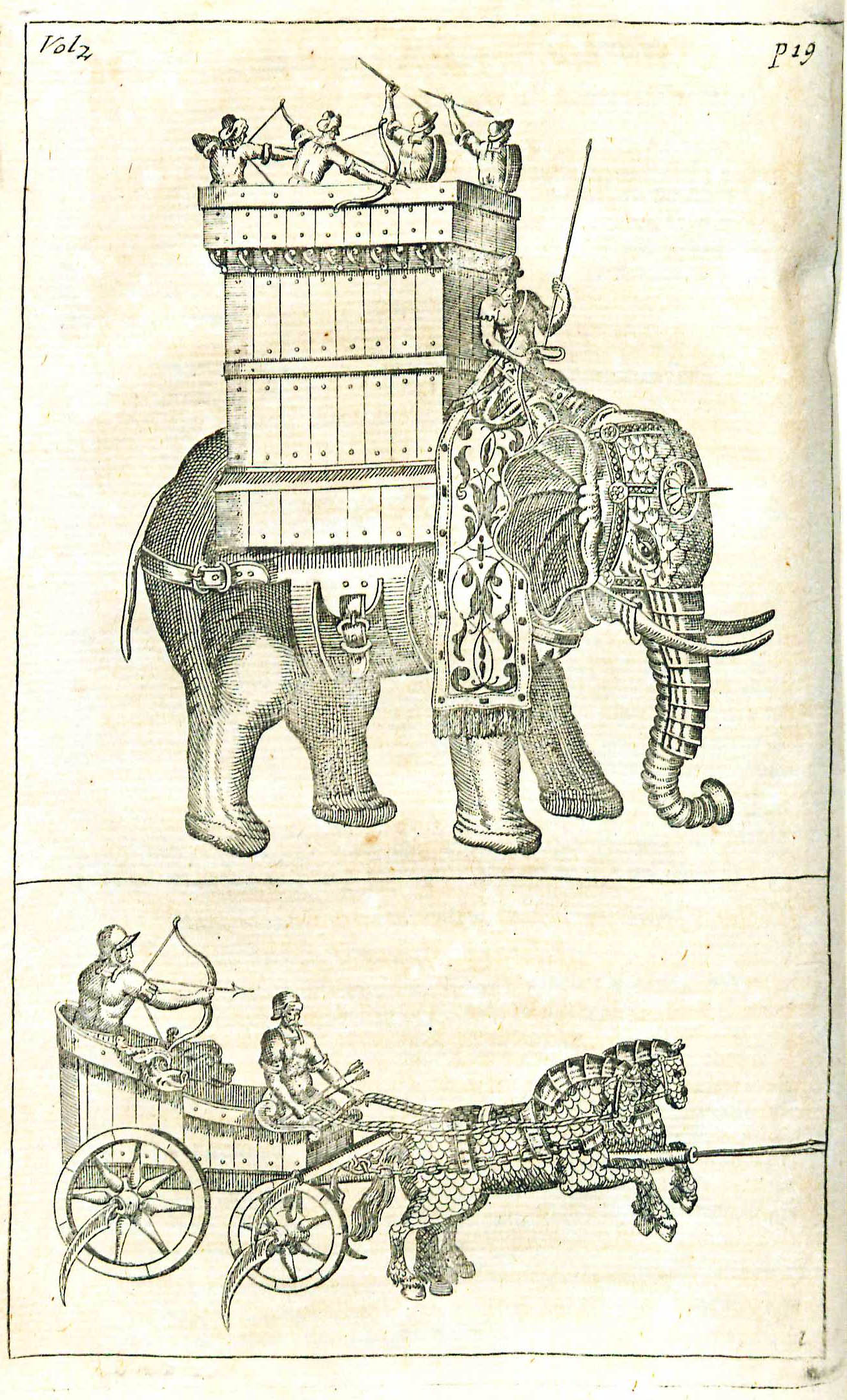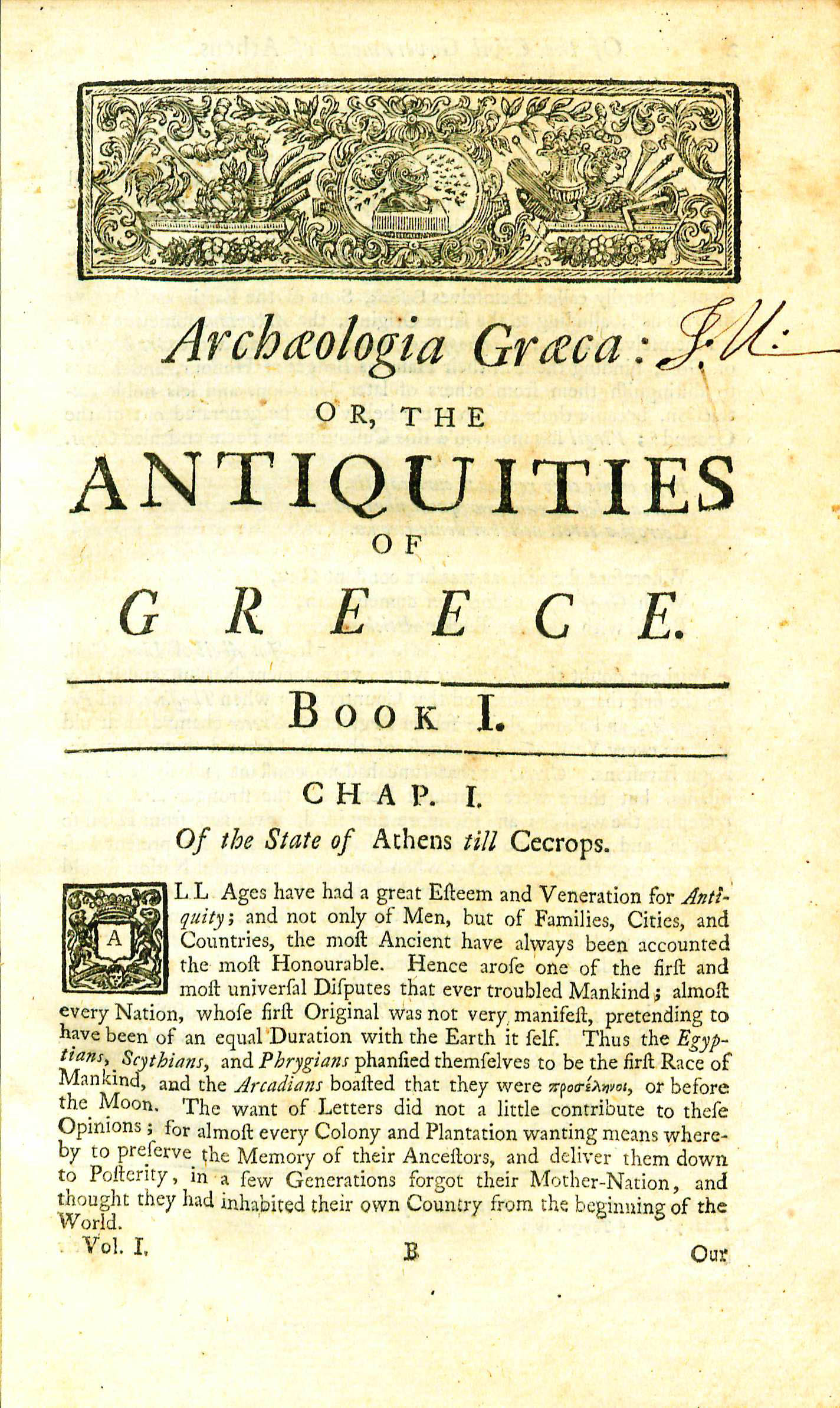Difference between revisions of "Archaeologia Graeca"
m |
(Summary paragraphs by Elizabeth Berry.) |
||
| Line 2: | Line 2: | ||
===by John Potter=== | ===by John Potter=== | ||
__NOTOC__ | __NOTOC__ | ||
| − | + | {{BookPageInfoBox | |
| − | + | |imagename=PotterArchaeologiaGraeca1728TitlePageV1.jpg | |
| − | + | |link=https://catalog.swem.wm.edu/law/Record/534154 | |
| − | + | |shorttitle=Archæologia Græca: or, The Antiquities of Greece | |
| − | + | |vol=volume one | |
| − | + | |author=John Potter | |
| − | + | |editor= | |
| − | + | |trans= | |
| − | + | |edition=5th | |
| − | ''' | + | |publoc=London |
| + | |publisher=Printed for J. Knapton, R. Knaplock, J. and B. Sprint, D. Midwinter, A. Bettesworth, R. Robinson, W. and J. Innys, J. Osborne, T. Longman, W. Mears, and A. Ward | ||
| + | |year=1728 | ||
| + | |set=2 | ||
| + | |pages= | ||
| + | }}[http://en.wikipedia.org/wiki/John_Potter_(bishop) John Potter] (1673/4-1747) was born in Yorkshire, England. Potter spent much of his early life in education, learning at both Queen Elizabeth Grammar School, and University College, Oxford. His years in Oxford led him to join the Church of England and abandon the Presbyterian faith of his father which led to a complete breach with his family. 1694 saw Potter's election as Yorkshire fellow of Lincoln College; he remained in that position until 1706.<ref>Rebecca Louise Warner, [http://www.oxforddnb.com.proxy.wm.edu/view/article/22612 "Potter, John (1673/4–1747)" in ''Oxford Dictionary of National Biography'' (Oxford University Press, 2004- ) , accessed October 24, 2013.</ref> During his time at Lincoln College, around the age of twenty-four, Potter became a rector. Further clerical positions followed, deacon, ordained priest, chaplain to the archbishop of Canterbury, and bishop of Oxford. In 1737, he was appointed archbishop of Canterbury, a position he held until his death ten years later.<ref> Encyclopedia Britannica Online, s.v. “archbishop of Canterbury,” accessed October 18, 2013, http://www.britannica.com/EBchecked/topic/93055/archbishop-of-Canterbury.</ref>[[File:PotterArchaeologiaGraeca1728IllustrationV2.jpg|left|thumb|200px|<center>Illustration from volume two.</center>]]<br /> | ||
| + | <br /> | ||
| + | Potter published several works on the rights of the church in which he opposed contemporary efforts at reform. In addition to these, Potter, skilled in Greek and very interested in classical history, enjoyed a noted reputation for his historical works on ancient Greece such as ''Archæologia Græca''. Originally published in 1697 and 1698, ''Archæologia Græca'' has been praised thus, "The warm eulogies of Gronovius attest the merit of this celebrated work. Potter ... had of course availed himself of the writings of Meursius, but he has also contributed to supersede them."<ref>Henry Hallam, ''Introduction to the Literature of Europe from the Fifteenth, Sixteenth, and Seventeenth Centuries'', 4th ed. (Boston: Little, Brown and Company, 1854), 3:254.</ref> | ||
==Evidence for Inclusion in Wythe's Library== | ==Evidence for Inclusion in Wythe's Library== | ||
| Line 22: | Line 29: | ||
View this book in [https://catalog.swem.wm.edu/law/Record/83695 William & Mary's online catalog.] | View this book in [https://catalog.swem.wm.edu/law/Record/83695 William & Mary's online catalog.] | ||
==External Links== | ==External Links== | ||
| − | [http://books.google.com/books?id=sFUPAAAAQAAJ&printsec=frontcover | + | [http://books.google.com/books?id=sFUPAAAAQAAJ&printsec=frontcover Volume 1:Google Books]<br /> |
| − | [http://books.google.com/books?id=v1UPAAAAQAAJ&printsec=frontcover | + | [http://books.google.com/books?id=v1UPAAAAQAAJ&printsec=frontcover Volume 2:Google Books] |
| − | + | ==References== | |
| − | |||
<references/> | <references/> | ||
Revision as of 20:27, 24 October 2013
by John Potter
| Archæologia Græca: or, The Antiquities of Greece | |
|
Title page from Archæologia Græca: or, The Antiquities of Greece, volume one, George Wythe Collection, Wolf Law Library, College of William & Mary. | |
| Author | John Potter |
| Published | London: Printed for J. Knapton, R. Knaplock, J. and B. Sprint, D. Midwinter, A. Bettesworth, R. Robinson, W. and J. Innys, J. Osborne, T. Longman, W. Mears, and A. Ward |
| Date | 1728 |
| Edition | 5th |
| Volumes | 2 volume set |
Potter published several works on the rights of the church in which he opposed contemporary efforts at reform. In addition to these, Potter, skilled in Greek and very interested in classical history, enjoyed a noted reputation for his historical works on ancient Greece such as Archæologia Græca. Originally published in 1697 and 1698, Archæologia Græca has been praised thus, "The warm eulogies of Gronovius attest the merit of this celebrated work. Potter ... had of course availed himself of the writings of Meursius, but he has also contributed to supersede them."[3]
Evidence for Inclusion in Wythe's Library
Description of the Wolf Law Library's copy
Bound in contemporary tooled paneled calf with red calf spine labels and the title page printed in red & black. Contains 31 copper engraved plates and a dollop of impressed red sealing wax on each front pastedown. Purchased from Kenneth Karmiole, Bookseller, Inc.
View this book in William & Mary's online catalog.
External Links
Volume 1:Google Books
Volume 2:Google Books
References
- ↑ Rebecca Louise Warner, [http://www.oxforddnb.com.proxy.wm.edu/view/article/22612 "Potter, John (1673/4–1747)" in Oxford Dictionary of National Biography (Oxford University Press, 2004- ) , accessed October 24, 2013.
- ↑ Encyclopedia Britannica Online, s.v. “archbishop of Canterbury,” accessed October 18, 2013, http://www.britannica.com/EBchecked/topic/93055/archbishop-of-Canterbury.
- ↑ Henry Hallam, Introduction to the Literature of Europe from the Fifteenth, Sixteenth, and Seventeenth Centuries, 4th ed. (Boston: Little, Brown and Company, 1854), 3:254.


